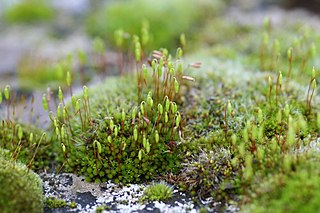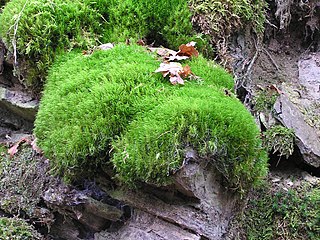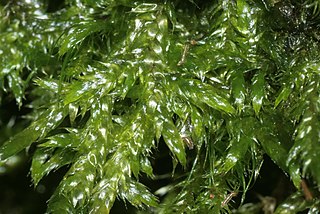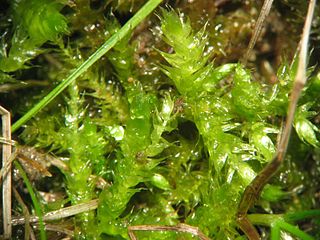Gradsteinia is a genus of moss in family Amblystegiaceae.
Leucoperichaetium is a genus of moss in family Grimmiaceae.
Platyhypnum is a genus of mosses in the family Amblystegiaceae.

Bryaceae is a family of mosses.

Dicranaceae is a family of haplolepideous mosses (Dicranidae) in class Bryopsida. Species within this family are dioicous. Genera in this family include Dicranum, Dicranoloma, and Mitrobryum.
Ryszard Ochyra is a Polish bryologist. He has focused on moss systematics of the Southern Hemisphere, specifically in the families Amblystegiaceae, Dicranaceae, Grimmiaceae, and Seligeriaceae. Throughout his career, he has described 48 species of moss considered new to science.

Racomitrium lanuginosum is a widespread species of moss found in montane and arctic tundra, the genus Racomitrium is found across the Northern and Southern hemispheres., however Racomitrium lanuginosum is only found in the Northern hemisphere. It grows as large mats on exposed rock and in boulder scree, particularly on acidic rocks. Its leaves have a characteristically decurrent and toothed hair-point, which gives rise to its regional common names woolly fringemoss, hoary rock-moss and woolly moss.

Racomitrium is a genus of mosses in the family Grimmiaceae established in 1818 by Samuel Elisée Bridel-Brideri. It contains the following species:

Grimmiaceae is a family of mosses in the order Grimmiales.

Sematophyllaceae is a family of mosses, known commonly as signal mosses. They grow on rocks in wet or humid places. and are found nearly worldwide, especially in tropical and temperate regions. There are about 150 species, which form yellow to yellow-green mats with reddish stems.
Cephaloziella elegans is a species of liverworts. It is found in the Russian Federation.

Bryum elegans is a species of mosses in the family Bryaceae. It is found in Norway, Poland, and the Russian Federation.
Anisothecium elegans is a species of mosses in the family Dicranaceae. It is found in Chile.

Bucklandiella is a genus of moss in the family Grimmiaceae.

Brachytheciaceae is a family of mosses from the order Hypnales. The family includes over 40 genera and 250 species.

Palustriella is a genus of mosses belonging to the family Amblystegiaceae.

Coscinodon is a genus of mosses belonging to the family Grimmiaceae.
Dryptodon is a genus of mosses belonging to the family Grimmiaceae.
Coscinodon lawianus is a species of moss in the family Grimmiaceae endemic to East Antarctica. It is one of only two species of moss found only in continental Antarctica, out of 23 species found on the continent. It is found on exposed rocks on nunataks and oases scattered across the region, stretching from Queen Maud Land to Princess Elizabeth Land. Initially described as part of the genus Grimmia, it was reclassified into Coscinodon by Polish bryologist Ryszard Ochyra in 2004, owing to similarities with several South American species. C. lawianus is likely a remnant of the Neogene flora of Antarctica which survived the rampant glaciation and cooling of the continent on remote rocky outcrops.









